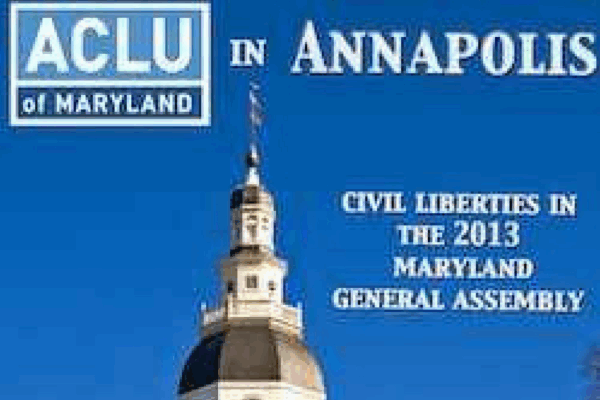The 2013 Maryland legislative session is in full swing and the ACLU of Maryland has been hard at work defending and advancing civil liberties in the General Assembly.
From voting rights to privacy to indefinite detention, check out the roundup below to read more about what issues we are tackling this week in Annapolis.
Is your privacy the new cost of riding a bus?
Many people rely on buses as their main source of transportation, and while the bus itself may not be private, conversations with loved ones, lawyers, or doctors that take place on the bus certainly can be.
MTA buses already have cameras - as many as six - that are constantly videotaping. In addition to recording everything that people do, now MTA wants to record everything they say. That is why the ACLU testified on SB 182 on Tuesday, Feb 19, against audio recording on MTA Buses.
Here is what ACLU of Maryland staff attorney David Rocah said about the issue:
"We believe that transit riders should not have to give up their fundamental right to privacy, and have all of their conversations recorded, as a condition of riding a bus.
The privacy implications of audio recording in public go far beyond the rights of Marylanders who ride buses. At stake is the principle that the government should not be able to record and monitor every conversation that takes place in a public locale."
Indefinitely detained in Maryland? Not on our watch!
Sara Love, the ACLU of Maryland's Public Policy Director, had this to say:
"Last year, Congress passed a statute authorizing this president and all future presidents to use the military to indefinitely detain people located far from any battlefield - without charge or trial - based on suspicion alone.
That kind of sweeping detention power is completely at odds with our American values, violates the Constitution, and corrodes our Nation's commitment to the rule of law, which generations have fought to preserve. This legislation holds promise in sending a strong, bipartisan message from the State of Maryland to Congress that the indefinite military detention provisions of the NDAA should be repealed."
Universal Access to Driver Licenses - A Commonsense Measure
ACLU of Maryland's Immigrants Rights Fellow Sirine Shebaya testified on Wednesday, Feb. 20 in favor of universal access to driver licenses to the Senate Judicial Proceedings Committee:
"Expanding Marylanders' access to a license to drive is sound public policy, promotes public safety, and is necessary to ensure that all of Maryland residents are treated with equal dignity and respect. The provision of limited use driver's licenses to individuals without proof of lawful immigration status does not affect Maryland's compliance with the federal REAL ID Act of 2005 and makes all of Maryland's residents better off."
We strongly support this measure in the Maryland Highway Safety Act of SB 715 because of the fundamental importance of driver licenses not only to an individual's ability to perform the most essential daily tasks - but also to public safety.
Greater Voting Access Makes a Greater Democracy
To us at the ACLU, voting is the defining act of citizenship and a cornerstone of our democracy. That is why making the franchise more accessible to all eligible voters has been a top legislative priority for us in 2013.
On Thursday, Feb. 21 the ACLU of Maryland testified in favor of HB 224 that would improve access to voting through measures such as same-day voter registration and expanded early voting:
"This past Election Day, we heard from members across the state that they stood in line for hours only to find they had been kicked off the voter rolls, and there was no option for them to register at the polls to cast a ballot that counts. Allowing voters to register to vote during the election ensures that no eligible voter is turned away."
Prosecutions for Profit
The ACLU of Maryland this week testified in favor of legislation that would create a task force to study the use of private prosecution diversion programs.
What is a private prosecution diversion program? ACLU's David Rocah sums it up with his own question:
"Are district attorneys renting out their letterhead and authority to for-profit companies that frighten possibly innocent people to pay fees and attend pricey classes with threats of criminal prosecution?"
Turning over core prosecutorial functions to private companies raises serious legal concerns: Are the local prosecutors actually investigating claims that a crime has occurred? What is the adequacy of the proof of violation? Isn't there a conflict of interest when companies conduct investigations with a financial stake in the outcome?
That's why a task force to study the programs is necessary, which SB 793 creates.
Keep an eye on this blog for regular legislative updates!
Written by Sana Javed, Communications Associate

